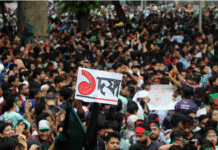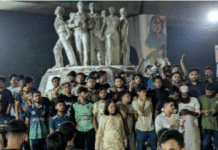Reja’s death should set alarm bells ringing all over

Here is a story that should alert us all. On December 29, a law student named Rejaul Karim Reja, 30, was having tea with friends at a roadside tea stall around 8 pm near his home in Barisal town. Police Sub-Inspector Mohiuddin Mahi of Detective Branch (DB) along with two constables, all in plain clothes, picked him up, slapping and hitting him while shouting that he was both a drug user and a peddler. They then took him to the local DB office. There is no report of whether Mahi or any other DB official tested him for drug use. On December 30, he was presented to the court. While in court, his relatives came to see him, when he recounted the horrifying story of brutal beating to them. The court sent him to jail.
Seeing telltale signs of brutal assault, the jail superintendent, Prashanta Kumar Banik, brought in a doctor who sent him straight to the jail hospital, recording in the forwarding note that there were injury marks on his ankles. After more than 36 hours, at 9 pm on January 1, according to Banik, Reja started “bleeding from his leg” and was sent to Sher-e-Bangla Medical College Hospital (SBMCH)—where he was kept for more than 24 hours and later pronounced dead after midnight, at 12:05 am on January 3 to be precise. The director of the hospital, Bakir Hossain, said Reja died of excessive bleeding through his rectum and urinary tract.
On the evening of January 1, his wife, who was in Jashore when the incident occurred, rushed to his hospital bed at SBMCH and saw him losing blood through his rectum and urinary tract. He told his wife how he was mercilessly beaten with metal pipe and kicked repeatedly in the stomach, and that he had been bleeding for many hours and also feared for his life. He died subsequently.
Reja’s father Yunus Munshi said his son was in good health at the time of his arrest. He said jail authorities had called him at 9 pm on Friday, January 1, and informed him that Reja was bleeding after he fell in the bathroom and was admitted in SBMCA. “We went to the hospital and found injuries on his legs, chest and neck… He was losing blood with stool and urine… Police tortured and killed my son,” he said. His neighbour Sujan told this paper that he saw injury marks all over Reja’s body.
While police have constituted a three-member inquiry committee to investigate the case—headed by a deputy commissioner of the Barishal Metropolitan Police—another officer of the same rank (rank is very important in institutions such as these), DB Deputy Commissioner Manzur Hossain, claimed that Reja was a drug dealer and fell ill due to drug-related complications and died as a result, and that police did not torture him. This conclusion has come before any post-mortem on the body, and before the inquiry committee had a chance to deliberate. We can easily imagine what chance there is of unearthing the actual truth.
Many questions arise from the above story. Why did SI Mohiuddin Mahi suddenly pick him up? After all, there was no complaint against him. Why were Mahi and his two assistants in plain clothes? How can one distinguish between common criminals and the police if the latter are not in uniform? Aren’t there clear police guidelines that prohibit officers from arresting anybody while not in uniform? A Supreme Court directive mandates that relatives should be informed within 12 hours of a person being arrested from any place other than home. Was this followed in Reja’s case?
Questions also arise as to why Reja was bleeding through his rectum and urinary tract. What could have led to that? Can drug addiction—and there is no evidence that he was on drugs since 2017—lead to such bleeding? How thorough was his examination at the jail hospital? What was the diagnosis and treatment? Was an X-ray taken at any stage (which should have revealed his state of internal bleeding)? At the SBMCA, which is a far bigger and better equipped hospital, what treatment was rendered to him?
Would it be wrong to conclude that Reja’s death was first caused by police torture and later by medical neglect? The truth is unlikely to emerge through an investigation involving police officials conducted by their own colleagues.
We want to pose some serious questions to our leaders, the lawmakers, and also those running the police about the present state of police accountability. We know police operate under clear guidelines. But how are officers who turn criminals controlled? There is, mostly in name, some mechanism of ensuring disciplinary action against errant police officials. Does that really work? Recently, under the present IGP, measures were being taken against police found to be using drugs. A very good initiative. But what actions did the police take in cases of custodial deaths? The police force is the only body empowered by the law to kill, but under strict guidelines and only to protect the public. Nowadays, however, police are found to be killing for their own interest. Police officer Pradeep’s premeditated murder of retired army major Sinha is a case in point. The latest one is Reja’s. Will proper investigation be done and the rogue SI be punished? What about the senior officials who seem to care very little about justice and more about protecting their errant colleagues?
With the enactment of Torture and Custodial Death (Prevention) Act, 2013, it was hoped that such incidents would stop. In fact, in September when, for the first time, three former policemen of Pallabi Thana were found to be guilty in a court verdict, it was hoped that it would send a stern signal for the police force to bring in internal reforms. That hope remains elusive.
I would like to conclude by reproducing the oath of office that every police official takes on being appointed:
On my honour, I will never betray my badge, my integrity, my character or the public trust.
I will always have the courage to hold myself and others accountable for our actions.
I will always uphold my country, constitution and Bangladesh Police.
How ironic.
Mahfuz Anam is Editor and Publisher, The Daily Star.









